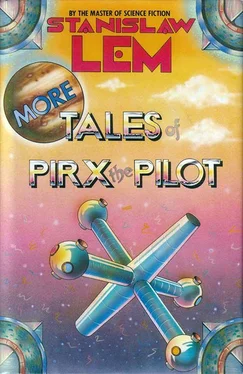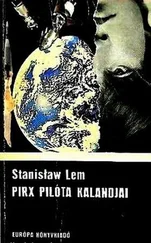But why the long preamble? Because that book was my salvation. Meteoroids? In all the weeks I spent hunting down hulks in the twenty-to-thirty-thousand-ton range, I must have missed at least half of the meteoroids on the radar. Oh, yes. Once, while we were in free fall, I had to grab my halfbreed friend by the neck—which was a lot trickier than grabbing that receiver must have been, and a damned sight less glamorous. I’m rambling again, I know. But the whole thing began in just such an unglamorous way.
When the two-month round-up was over, I had between a hundred twenty and a hundred forty thousand tons of scrap in tow, and was Earthbound along the ecliptic plane. Was that against regs? You bet. Like I said, I had to scrimp on fuel, which meant I had to coast for over two months without thrust. Then doomsday struck. Not meteoroids—this wasn’t a novel, after all—but the mumps. First my nucleonics engineer, then both pilots at once, and so on down the line. The whole bit—swollen pusses, slits for eyes, high fever. Soon everybody was on the sick list. Ngey, a black, the Pearl’s cook, steward, and chief something-or-other, had brought the wicked virus aboard ship. He was sick, too, of course! Say, don’t kids in South America ever get the mumps?
So there I was, commander of a ghost ship, or almost: I still had a radiotelegraph operator and a second engineer. Never mind that the operator was stinko from breakfast on. Not altogether gone: whether he was a sipper or he had a cast-iron stomach, the fact is he never stopped bustling, especially when we were weightless (which was most of the time, not counting a few minor course corrections). But the stuff was in his eyes, in his brain, so that every order, every errand, had to be checked and rechecked. I had fantasies of getting even the moment we touched down—because how could I cripple him up there? Sober, he was a typical rat, gray, sneaky, always unwashed, with a charming habit of calling certain people by the worse obscenities during mess. In Morse. That’s right, in Morse, tapping it out on the table with his finger and almost triggering a few fistfights in the process (naturally, all were fluent in Morse), claiming it was a nervous tic the moment he was cornered. When I told him to keep his elbows at his sides, he’d tap with his foot or his fork—the guy was a real artist.
The only really able-bodied man was the engineer—who turned out to be a civil engineer. No fooling. Signed on at half pay, no questions asked, and it never crossed my mind to quiz him when he came aboard. The agent had asked him whether he knew his way around construction sites and machines, and of course he said yes. He neglected to mention what kind of machines. I told him to stand watch, though he couldn’t tell the difference between a planet and a star. Now you know why Le Mans made such huge profits. For all his agents knew, I might have been a submarine navigator. Oh, sure, I could have deserted them for my cabin. I could have, but I didn’t. That agent wasn’t so dumb. He was counting, if not on my loyalty, then on my instinct for self-preservation. On my desire to get back in one piece. And since the scrap, more than a hundred thousand tons’ worth, was weightless, uncoupling it wouldn’t have boosted our speed by a millisecond. Besides, I wasn’t a bastard. Not that I didn’t flirt with the idea as I made my morning rounds with the cotton, baby oil, bandages, rubbing alcohol, aspirin…
No, that book about cosmic romance and meteoroid typhoons was really my only escape. I even reread passages, some of them a dozen times. The book fairly brimmed with space hijinks—a rebellion of electrobrains, pirates’ agents with microtransmitters planted in their skulls, not to mention that beauty from an alien solar system—but not a single word about the mumps. Which was fine by me, obviously. I was sick of the mumps. Of astronautics in general.
During off hours I hunted high and low for the radiotelegraph operator’s liquor stock. Though I may be giving him too much credit, I suspect he deliberately left a trail just so I wouldn’t waver and give up the crusade. I never did locate his supply. Maybe he was a sponge and kept it stored inside. And I searched , my nose to the deck the way a fly hugs the ceiling, sailing around back aft and midships the way you do in dreams. I was all by my lonesome, too—my swollen-jawed crew quarantined in their cabins, my engineer up in the cockpit learning French from tapes, the ship like a funeral parlor except for the occasional wail or aria traveling through the air-conditioning ducts. The latter came from the Bolivian-Mexican, who every evening routinely suffered an attack of Weltschmerz. What did I care about the stars, not counting those in my book, of course, the juicier parts of which I knew by heart (mercifully forgotten by now). I was waiting for the mumps epidemic to end, because my Robinson Crusoe existence was beginning to tell.
I was even ducking the civil engineer. He was an OK sort of guy in his own way, but he swore he would never have signed on if his wife and brother-in-law hadn’t got him in debt. In short, he belonged to that species of man I can’t stand: the excessively confiding type. I don’t know whether he was gushy only with me. Probably not. Most people are guided by a sense of discretion, but this guy would confess anything, to the point of making my insides crawl. Fortunately, the Pearl’ s twenty-eight-thousand-ton rest mass offered plenty of room to hide.
As you might have guessed, it was my first and last trip for Le Mans. Ever since, I’ve been much the wiser, which doesn’t mean I haven’t had my share of adventures. And I wouldn’t be telling you about this one—perhaps the most embarrassing of my career—if it weren’t for that other, fairytale, side of astronautics. Remember, I warned you this story would sound like a sci-fi tale.
The alert came when we were about even with Venus’s orbit. But either our operator was napping on the job or he forgot to record it, because it wasn’t until the next morning that I heard the news on Luna’s daily meteoroid forecast. At first, frankly, I thought it was a false alarm. The Draconids were far behind us and things were quiet except for the usual swarms, nor was it Jupiter up to its perturbational pranks, because this was on a different radiant. Besides, it was only an alert of the eighth degree—a duster, very low density, the percentage of large-sized particles negligible—although the front was, well … formidable. One glance at the map and I realized we’d been riding in it for a good hour, maybe two. The screens were blank. A routine shower, I thought. But the noon bulletin was far from routine: Luna’s long-range trackers had traced the swarm to another system!
It was the second such swarm in astronautical history. Meteoroids travel along elliptical paths gravitationally tied to the sun like yo-yos; an alien swarm from outside the solar system, from somewhere in the galaxy at large, is regarded as a sensation, although more by astrophysicists than by pilots. For us, the difference is one of speed. Swarms in our own system travel in circum-terrestrial space at speeds no greater than the parabolic or the elliptical; those from outside may—and, as a rule, do—move at a hyperbolic velocity. Such things may send meteoritologists and astroballisticians into ecstasy, but not us.
The radiotelegraph operator was fazed neither by the news nor by my lunchtime lecture. An engine burn (to low thrust, naturally) plus a course adjustment had given us just enough gravity to make life bearable: no more sucking soup through straws or squeezing meatloaf puree out of toothpaste tubes. I’ve always been a fan of plain, ordinary meals.
The engineer, on the other hand, was scared stiff. My talking about the swarm as casually as if it were a summer shower he took as a sure sign of my insanity. I gently reassured him that it was a dust cloud, moreover a very sparse one; that the odds of meeting up with a meteoroid large enough to do any damage were lower than those of being crowned by a falling theater chandelier; that we couldn’t do anything, anyway, because we were in no position to execute any evasion maneuvers; and that, as it happened, our course in good measure coincided with the swarm’s, thus significantly reducing the chances of a collision.
Читать дальше












